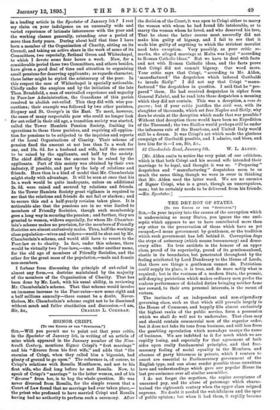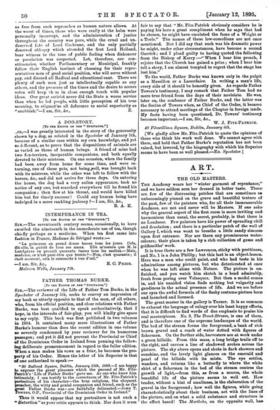THE DRY-ROT OF STATES.
[To THE EDITOR OF THE "SPECTATOR."]
Sin,—In your inquiry into the causes of the corruption which is undermining so many States, you ignore the one anti- septic which appears to me to have contributed more than any other to the preservation of those which have as yet escaped,—I mean government by gentlemen, or the tradition which such government has left behind it. Corruption dogs the steps of autocracy (which means bureaucracy) and demo- cracy alike. Its true antidote is the honour of an upper class, proud of its superiority, proud of its gentlemanhood, elastic in its boundaries, but penetrated throughout by the feeling attributed by Lord Dundreary to the House of Lords, that there are things a gentleman cannot dd. Patriotism could supply its place, it is true, and do more nobly what is required; but in the vastness of a modern State, the prosaic, self-denying patriotism which makes ordinary men prefer the zealous performance of detailed duties bringing neither fame nor reward, to their own personal interests, is the rarest of virtues.
The instincts of an independent and non-stipendiary governing class, such as that which still prevails largely in the House of Commons, and happily fills almost exclusively the highest ranks of the public service, form a possession which we shall do well not to undervalue. That class may and should contain commercial men of the superior order, but it does not take its tone from business, and still less from the gambling speculation which nowadays usurps the rame of business. We are indebted to it for much which we are rapidly losing, and especially for that agreement of both sides upon really fundamental principles, and that free- masonry feeling of social equality in the Members, and absence of party bitterness in private, which I venture to assert are essential to Parliamentary government of the English type, and can alone render possible those unwritten laws and understandings which gave our popular House its lost pre-eminence over all similar assemblies. I do not forget the nepotism, the supine acceptance of unearned pay, and the abuse of patronage which charac- terised the eighteenth century when the upper class reigned supreme. No doubt it needed the watchfulness and the spur of public opinion ; but when it had them, it rapidly became as free from such reproaches as human nature allows. At the worst of times, those who were really at the helm were personally incorrupt, and the administration of justice throughout the country was pure, while the cruel and un- deserved fate of Lord Cochrane, and the only partially deserved oblcquy which attended the first Lord Holland, bear witness to the tone of public feeling when dishonour or peculation was suspected. Let, therefore, our con- stituencies, whether Parliamentary or Municipal, frankly follow their English instinct of choosing for their repre- sentatives men of good social position, who will serve without pay, and discard all Radical and educational cant. There are plenty of such men just as intellectually capable as any others, and the pressure of the times and the desire to secure votes will keep th m in close enough touch with popular ideas. Our great satirist never did the State a worse service than when he led people, with little perception of his true meaning, to stigmatee all deference to social superiority as



































 Previous page
Previous page